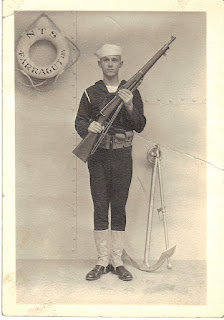There was a lively debate raging in the United States over whether we had any business getting involved in a foreign was when the Japanese bombed Pearl Harbor, Hawaii. The events that happened on November 7th, 1941 changed everything.
There were still people who felt we shouldn't engage in a war so soon after World War 1, but the majority of the country were outraged that another country would attack us without provocation.
Young men from all over the United States rushed to recruiting offices to sign up to fight. My father wanted to be one of those, but his mother informed him he was to finish high school before he went anywhere.
For anyone who knew my grandmother knows it would take a force much more powerful that a mere war to change her mind.
Dad waited six long months and the day he graduated from Boise High, he signed up for the Navy.
He was assigned to the USS Hancock, the Fighting
 Hannah as she was called by those who served on her.
Hannah as she was called by those who served on her.For a small town boy, this was the big time. He spent
most of his time aboard the Hancock in the Pacific,
raiding Japanese occupied bases in the Philippines and
Okinawa. He saw more action than anyone would have
liked including a direct hit to the Hancock by a Japanese suicide bomber.
In one of the worst incidents to happen on the Hancock, one of the newer pilots came back to the ship with damaged landing gear. He was in a panic, and all though the officers tried to calm him, he refused to listen. they advised him to bail out and ditch the plane in the sea. Instead, the pilot tried to land on the Hancock, crashing into other planes on deck. Fuel tanks exploded injuring many men and damaging the ship.
Raised in Pennsylvania, during the depression with twelve brothers and sisters, my father-in-law, John Bochenek, had two choices in life. He could become a coal miner like his father or join the military. He chose the latter and became a bombadeer during the Second World War. He flew many missions over what was called the Burma Hump. The hump was the name given by Allied pilots in the Second World War to the eastern end of the Himilayan Mountains over which they flew military transport aircraft from India to China to resupply the Chinese war effort and the units of the US Armed Forces based in China.
The airlift began in April 1942, after the Japanese blocked the Burma Road and continued on a daily basis from May 1942 to August 1945.
He brought back many pictures and stories of his time spent there. John stayed in the military until he retired as a Master Sargent.
Thank you, Dad and John, and all the others who sacrificed to save out country. Thanks to all the men and women who still today give up so much so we can remain free.



Beautiful post. That was truly a heroic generation. My dad was too young and he missed the war, but his older brother and his brother-in-law flew over occupied Europe. One of my uncles was a bombadier, the other a tail gunner. One was shot down over France and spent 18 months in a POW camp. The other had a portion of his jaw blown-off but managed to fly the plane back to England when the pilot was killed. What stories they told...
ReplyDeleteI lost an uncle in the Korean war. He was a bombadeer in WW2 and when he came home, he couldn't find a job. He reupped and became a pilot. He was shot down over the China Sea. The stories my dad tells are amazing.
ReplyDeleteThanks for sharing.